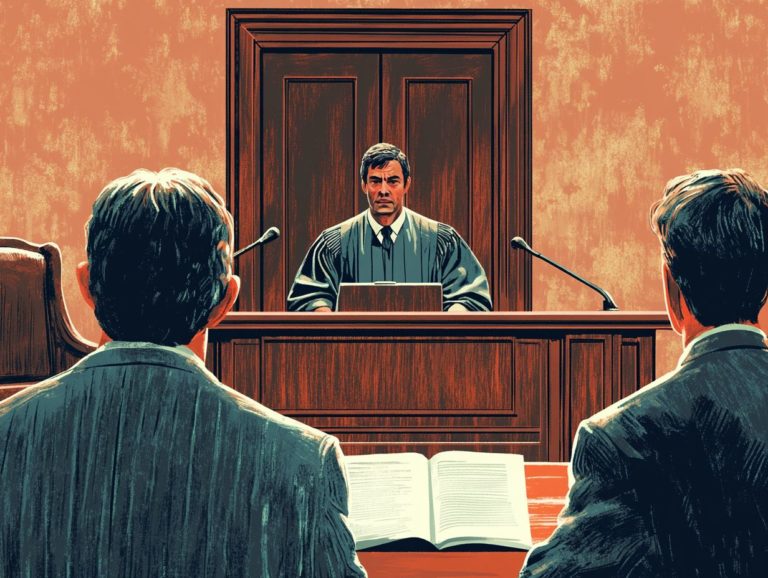How to Defend Against an IP Claim?
Intellectual property (IP) claims can feel overwhelming, whether you re a creator, a business owner, or just trying to navigate the intricate landscape of rights and protections.
This article distills the essentials of IP claims, guiding you through the various types, the steps to assess their validity, and how to consult legal counsel effectively. You ll also learn about viable defenses, settlement options, and proactive strategies to safeguard your intellectual property.
By grasping these elements, you ll gain the confidence needed to navigate the complexities of IP effectively.
Contents
- Key Takeaways:
- What Are Intellectual Property Claims?
- Steps to Take When Faced with an IP Claim
- Defenses Against IP Claims
- Settlement and Litigation Options
- Preventing IP Claims
- Frequently Asked Questions
- What is an IP claim and why do I need to defend against it?
- What steps can I take to defend against an IP claim?
- What are some common defenses against an IP claim?
- Can I countersue in response to an IP claim?
- What are the potential consequences of losing an IP claim?
- What if I receive an IP claim but I believe I am not infringing on anyone’s rights?
Key Takeaways:

Know the different types of IP claims to defend against them effectively. When faced with an IP claim, assess its validity and consult legal counsel for guidance. To further enhance your understanding, learn how to identify and protect your IP and understand defenses like fair use to protect against IP claims.
What Are Intellectual Property Claims?
Understanding IP claims is essential for business owners. IP refers to the legal rights that protect your creative work and inventions, helping preserve their economic value and your legal rights.
This includes copyrights, trademarks, patents, and trade secrets each crucial for providing economic advantages and a competitive edge in the marketplace.
Understanding these claims will help you navigate potential infringement issues more effectively and maintain strong IP protection strategies that safeguard your interests.
Types of IP Claims
There are various types of IP claims, each designed to protect specific forms of creative work and business identities.
For instance, copyrights safeguard original artistic and literary expressions, granting exclusive rights to reproduce, distribute, and display your works.
Trademarks protect your brand identifiers like logos and slogans ensuring consumers can easily distinguish your products and services from the competition.
Patents offer inventors exclusive rights to their innovations, allowing control over production and usage for a defined period.
Trade secrets protect valuable business information kept confidential, providing a competitive edge while safeguarding proprietary methods and processes.
Each of these claims plays a vital role in nurturing innovation and ensuring you can benefit from your original ideas and investments.
Steps to Take When Faced with an IP Claim
When you encounter an IP claim, take a structured approach to manage the situation effectively and consider how to handle IP disputes to minimize the risk of legal challenges.
This strategy enables you to navigate the complexities of the claim with confidence.
Assessing the Claim s Validity
Assess the claim s validity to protect your business. This process requires a thorough examination of the legal rights associated with the claim.
Scrutinize the legal rights to clarify whether ownership is clear and enforceable. Understand the potential for infringement claims, as these can lead to costly disputes that may disrupt your operations.
Analyze the economic impact; consider how the claim could influence revenue streams, market positioning, and long-term viability. By navigating these complexities, you can make informed decisions that safeguard your interests and secure your business s future.
For further information, consider consulting a legal expert regarding your IP concerns.
Consulting with Legal Counsel

Consulting with legal counsel, such as a trademark lawyer or a copyright registration specialist, is an essential step when facing an IP claim.
These professionals bring invaluable experience during the intricate process of patent filing and litigation. Their expertise helps you navigate the legal landscape effectively, ensuring your documentation is precise and all deadlines are met.
A knowledgeable attorney plays a crucial role in crafting customized strategies to protect your intellectual property, helping you mitigate risks and maximize protection against potential infringements.
By proactively addressing these challenges with legal experts, you can protect your ideas and investments, fostering an environment ripe for growth and creativity.
Defenses Against IP Claims
Defending against IP claims requires a clear understanding of the legal defenses available to you.
Understanding concepts like fair use can significantly impact the outcome of any infringement dispute.
Fair Use and Other Legal Defenses
Fair use is one of your most vital legal shields against IP claims. It means you can use someone else’s work without their permission under specific conditions. This doctrine balances the interests of creators and the public, allowing activities like commentary, criticism, news reporting, teaching, or research.
For example, in the landmark case Campbell v. Acuff-Rose Music, Inc., the Supreme Court determined that a parody of a song could qualify for fair use, even as a commercial venture, illustrating how transformative use can protect creators.
Educational institutions often rely on fair use when reproducing materials for teaching. Other defenses, like the first sale doctrine and public domain status, also offer significant protections and enrich your understanding of copyright law.
Settlement and Litigation Options
When confronted with an IP claim, you have several options to resolve the issue.
You can negotiate a settlement or, if necessary, pursue litigation.
Negotiating a Settlement
Negotiating a settlement can provide a more efficient resolution than lengthy litigation, often benefiting both parties economically.
By fostering open communication and mutual understanding, your negotiation process can shift from confrontational to collaborative. Successful discussions typically focus on clear objectives, allowing you to outline your position while being open to alternatives.
Establishing a respectful dialogue framework is crucial. It opens the door to creative options that address both parties’ interests. Ensuring that each party’s legal rights are preserved means approaching negotiations with a solid understanding of relevant laws and potential consequences, helping to avoid pitfalls from hasty agreements.
With a focus on fairness and respect, you ll find that the path to resolution becomes significantly smoother.
Going to Court

Going to court is a key step in addressing an IP claim. Here, the rights of all parties will be carefully examined.
Prepare for pre-trial motions and hearings, leading to a trial where evidence is presented before a judge or jury. The potential outcomes vary from a favorable ruling that upholds your rights to the dismissal of the case, or even counterclaims from the opposing party.
As new evidence arises or the case evolves, your legal strategies may need to adapt. This highlights the necessity of having seasoned legal counsel by your side to recalibrate tactics and offer guidance throughout this journey.
Conclusion
If you face an IP claim, act quickly to defend your rights! Consult a legal expert to secure the best possible outcome.
Preventing IP Claims
To prevent IP (intellectual property) claims, you must adopt proactive measures that safeguard your legal rights over your creations and ensure adherence to legal standards.
These steps are crucial to protect your assets in a competitive landscape.
Best Practices for Avoiding IP Infringement
Implementing best practices is vital to avoid IP infringement and protect your legal rights. One effective strategy is to conduct regular audits. This helps pinpoint potential vulnerabilities in your intellectual property.
This proactive approach reveals existing risks and offers insights to enhance your protections. Investing in employee training on IP awareness ensures your team understands the importance of intellectual property and their role in its protection.
It’s important to maintain thorough documentation practices, including detailed records of your creations and innovations. This meticulous approach serves as a robust defense should any disputes arise.
Protecting Your Own IP Rights
Protecting your own IP rights is essential for maintaining a competitive edge and maximizing the economic value of your innovations. By actively securing copyrights, trademarks, and patents, you can shield your unique ideas and creations from unauthorized use.
This proactive approach helps establish a strong brand identity and enhances your market position by preventing infringement. Utilizing confidentiality agreements and licensing contracts is significant in safeguarding these rights.
These agreements create a legal framework that fosters trust and collaboration, allowing you to share your work without fear of exploitation. Combining these strategies is crucial for nurturing creativity and sustaining long-term success.
Frequently Asked Questions
What is an IP claim and why do I need to defend against it?

An IP claim is a legal action taken against someone for infringement of intellectual property rights. This can include patents, trademarks, or copyrights. Defending against an IP claim is essential because it protects your own intellectual property and may save you from costly legal consequences.
What steps can I take to defend against an IP claim?
- Gather all evidence related to your use of the allegedly infringing property, including documents and emails.
- Consult with a lawyer specializing in IP law for guidance on the best defense strategy.
- Respond promptly to any legal notices or court summons related to the claim.
What are some common defenses against an IP claim?
One defense is fair use, allowing limited use of copyrighted material for purposes such as criticism, commentary, or news reporting. Another defense involves the claimant’s lack of evidence, where they cannot provide sufficient proof of infringement.
If you can prove that you created the material independently, this can also serve as a defense against an IP claim.
Can I countersue in response to an IP claim?
Yes, it is possible to countersue if the claim is found to be without merit or if the claimant is using it to harass or intimidate you. However, consult a lawyer before taking this action to understand any legal requirements or risks involved.
What are the potential consequences of losing an IP claim?
If the claim is valid and you are found guilty of infringement, you may be required to pay damages to the claimant, including lost profits and legal fees. You might also be ordered to cease using the infringing material or have it destroyed. In extreme cases, criminal charges may be brought against you.
What if I receive an IP claim but I believe I am not infringing on anyone’s rights?
If you believe the claim is invalid, you can dispute it. This can involve providing evidence that you have not infringed on any intellectual property rights or using one of the aforementioned defenses. Additionally, knowing what to do if your IP is infringed is crucial, and seeking legal counsel is essential to ensure you defend yourself properly against the claim.






